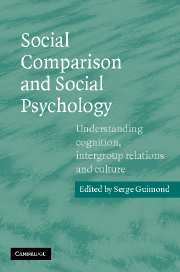Book contents
- Frontmatter
- Contents
- List of figures
- List of tables
- List of contributors
- Preface
- Introduction: social comparison processes and levels of analysis
- Part 1 Cognition: comparison processes within and between individuals
- Part 2 Intergroup relations: comparison processes within and between groups
- 5 Predicting comparison choices in intergroup settings: a new look
- 6 The variable impact of upward and downward social comparisons on self-esteem: when the level of analysis matters
- 7 Attitudes toward redistributive social policies: the effects of social comparisons and policy experience
- 8 Social comparison and group-based emotions
- 9 The counter-intuitive effect of relative gratification on intergroup attitudes: ecological validity, moderators and mediators
- 10 Social comparison and the personal group discrimination discrepancy
- Part 3 Culture: comparison processes within and across cultures
- Author index
- Subject index
- References
9 - The counter-intuitive effect of relative gratification on intergroup attitudes: ecological validity, moderators and mediators
Published online by Cambridge University Press: 27 October 2009
- Frontmatter
- Contents
- List of figures
- List of tables
- List of contributors
- Preface
- Introduction: social comparison processes and levels of analysis
- Part 1 Cognition: comparison processes within and between individuals
- Part 2 Intergroup relations: comparison processes within and between groups
- 5 Predicting comparison choices in intergroup settings: a new look
- 6 The variable impact of upward and downward social comparisons on self-esteem: when the level of analysis matters
- 7 Attitudes toward redistributive social policies: the effects of social comparisons and policy experience
- 8 Social comparison and group-based emotions
- 9 The counter-intuitive effect of relative gratification on intergroup attitudes: ecological validity, moderators and mediators
- 10 Social comparison and the personal group discrimination discrepancy
- Part 3 Culture: comparison processes within and across cultures
- Author index
- Subject index
- References
Summary
After five decades of research revealing that relative deprivation (RD) is a central variable in the explanation of intergroup prejudice, recent research suggests that the opposite of RD, the relatively ignored relative gratification (RG), is also an important determinant of prejudice. This chapter summarizes both recent studies and current development in this line of research. After presenting several experiments that test the respective effects of both RD and RG on intergroup attitudes, we address the question of the ecological validity of the RG effect. By looking at South African data, we show that the effect of RG on prejudice is not merely a laboratory artefact, nor is it limited to the French intergroup context. Finally, in the last part, we focus more directly on the “understanding” dimension by testing both moderators and mediators of the RG effect.
Understanding intergroup conflict and the factors that contribute to stereotyping and prejudice is a fundamental problem that has attracted the attention of social psychologists for many years. This chapter examines a new theoretical perspective in the explanation of prejudice. This perspective suggests that Relative Gratification (RG), the complete opposite of Relative Deprivation (RD), is a powerful determinant of various forms of negative or hostile intergroup attitudes. In common with relative deprivation theory (Walker and Smith, 2002), social identity theory (Tajfel and Turner, 1986), Equity Theory (Walster, Walster, and Berscheid 1978), and the five-stage model of intergroup relations (Taylor and McKirnan, 1984), this new perspective based on RG shares the assumption that social comparison processes are fundamental to an understanding of intergroup conflict (see Taylor and Moghaddam, 1994 for an overview of these theories).
- Type
- Chapter
- Information
- Social Comparison and Social PsychologyUnderstanding Cognition, Intergroup Relations, and Culture, pp. 206 - 227Publisher: Cambridge University PressPrint publication year: 2005
References
- 2
- Cited by

